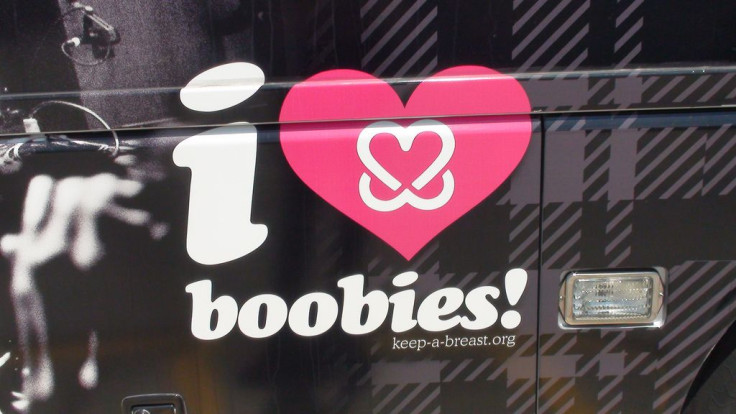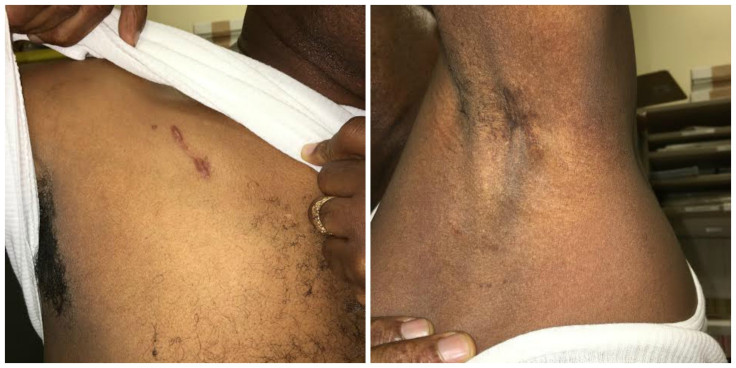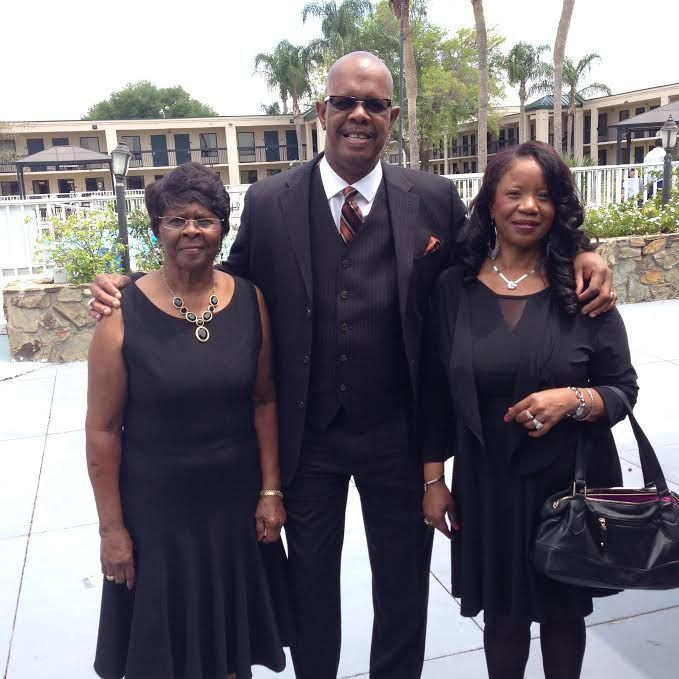Breast Cancer Awareness Campaigns Highlight Women Patients And Survivors, But What About Men With The Disease?

Its color is pink, it’s found in breasts, and 99 percent of cases develop in women. Imagine walking into a “Women’s Health Clinic,” being treated by a doctor who normally sees women, and having all of your fellow patients be women... when you're a man. In case you haven’t noticed, men will do anything to retain some semblance of their masculinity. It’s a little hard to feel macho when you’re being treated for, what most people consider, a woman’s disease.
Thankfully, we have men like Dwayne Bratcher, a 57-year-old male breast cancer survivor who was one of around 2,300 men diagnosed in 2013. Bratcher recently did the most macho thing a man in his position could do: tell his story in the hopes of helping other men who may not understand that even though breast cancer in men is rare, it's not impossible. Here’s what he had to say about receiving a diagnosis very few men expect to receive.
When was your diagnosis?
It was July of 2013. I was 55 years old. I am 57 years old now.
What was it like when you first received that diagnosis? Was it something you kind of expected after a self-examination or did it completely blindside you?
When you first hear "you have cancer," it's not good news. When I found out I had breast cancer, I was scared. I immediately began to think about death and family. Receiving the news pretty much blindsided me. But as I have learned through my experience, just because you hear "you have cancer," it's not the end of the road. You don’t just give up — keep going.

Did you exhibit any symptoms before your diagnosis?
No, I just had the lump under my armpit.
Why are self-exams so important, especially among men who don’t think they can develop breast cancer?
For me, I had a lump under my arm. I went to my medical doctor, who thought it was nothing. My doctor thought it was a sweat gland. With men, if you have something like I had or feel like something is off, go to the doctor and get a second or third opinion. That’s why I chose to get a second opinion at Cancer Treatment Centers of America (CTCA) at Midwestern Regional Medical Center (Midwestern) in suburban Chicago.
What was the hardest part about coming to grips with your diagnosis?
I guess the hardest part was learning that the cancer was in my lymph nodes, because those are all over your body. That was scary.
Another thing that was hard for me was being a man with breast cancer. I was embarrassed about that. When I was first diagnosed with breast cancer, it was very hard to deal with and I was ashamed. Now, I am fine with people knowing and I share my story with everyone because if I can help one person, I accomplished something.

Are people surprised when they find out you’re a breast cancer survivor?
Very, very surprised. Mostly, women are the most surprised because I’m usually the first person they have ever heard of having breast cancer as a man.
Do you have a family history of breast cancer?
My father had three sisters that died of breast cancer. So, right now, I am making sure my daughter and grandkids get tested.
What steps are your kids taking to make sure they haven’t inherited the disease?
I have two daughters. Because of my diagnosis, they are very scared, especially since I was re-diagnosed a month and a half ago. But, they keep me going. They make sure I eat right, walk, and exercise. I want to assure them I am OK.
When it comes to their susceptibility, I tell them to listen to their bodies. And this is not only for my daughters, but most people. Go to the doctor if you feel something is not right. And always get a second opinion. Just because you go to one doctor doesn’t mean you have to go with their diagnosis. Get another opinion to be safe.
What was the treatment process like for you?
At Cancer Treatment Centers of America at Midwestern, I had chemotherapy to shrink the tumor, the surgery to take out 15 lymph nodes, followed by radiation for six weeks. I also wear a compression sleeve. In addition to my treatment, I took advantage of some of the integrative oncology services at CTCA, including naturopathic medicine and acupuncture.
All throughout treatment, I continued working at Publix. I found that coming to work and being around people helped me through everything.
Now, I have been diagnosed with cancer in my spine. The last time I went in for my scans, my doctors found spots on my spine. At first, I was very sad when I found out that the cancer came back. Honestly, I was sad and depressed at first. I know that I have to take chemo again, probably for a long period of time. But, I pray every day. I believe in God. My family is my biggest supporters. Right now, I don’t even worry about it at all. I feel very good even knowing the process I have to go through.
Why do you use the compression sleeve?
If I do not use a compression sleeve, then there is a chance I could get lymphedema. This means that my arms would swell. My hand has swelled before when I was travelling on a plane because of the pressure changes in the air cabin. The compression sleeve helps manage this.
Did you have anyone to help you cope with your diagnosis and be there for your treatment? If so, how important was that?
Yes. My wife, my mother, my kids, and my brothers and sisters — my complete family. Also, I have a lot of supporters from all over. I have people at my church and at the store praying for me. Having their support is very important. They keep you going and make you feel good.

Do you think the experience differs among men and women?
I guess the biggest difference is that people are surprised that a man can get breast cancer. They look at you like, “you have breast cancer?” Like I said earlier, I am typically the first person they know that is a man with breast cancer.
I know that during breast cancer treatment, many women struggle with their body image. I don’t feel it is different for men. I had a port and a scan. I still have a spot where I had radiation. And when I was on chemotherapy, I gained a lot of weight. I never had a stomach before and I was afraid my wife wouldn’t find me attractive. Now, I lost weight. My wife bought a juicer and I juice every day. I eat the right foods now. I lost 20 pounds. I have a lot more energy now and I feel a lot better.
She tells me, “Dwayne, you look the same now.”
How has your life changed before and after the diagnosis?
Before I was diagnosed, I ate anything I wanted to eat, I smoked, I drank occasionally, and although I was close to my family, my job came first. After being diagnosed, my life has changed. I eat the right foods now and I juice every day. I do not smoke or drink. I am closer to my family and closer to God. I pray every day.
What type of message would you like to provide other men with breast cancer?
When you first hear that you have breast cancer as a man, you may be ashamed because people are not aware that men can have breast cancer. My message is that it could happen to you — you are not alone. Don’t be ashamed. You can help by sharing your story to educate other people.
What type of message would you like to provide other men who do not have breast cancer but may not understand their risk or the importance of getting tested?
Make sure you go to your doctor and get your regular checkups. If something is not right, especially like what happened with me in feeling a lump in my armpit, get a second opinion. That’s why I went to Cancer Treatment Centers of America in suburban Chicago. Cost and distance should not be a factor when looking at treatment — your health should always come first.
How do you carry out what you learned from your diagnosis in your everyday life? How has it changed the way you think?
I look at life totally different now. I used to take things for granted, and I don’t anymore. I changed my diet. I used to eat fried foods, and now I eat salads. And just looking at my kids. I am a lot closer to them. My life has changed drastically, and I realize that anything can happen. I don’t stress anymore about anything.
Published by Medicaldaily.com



























